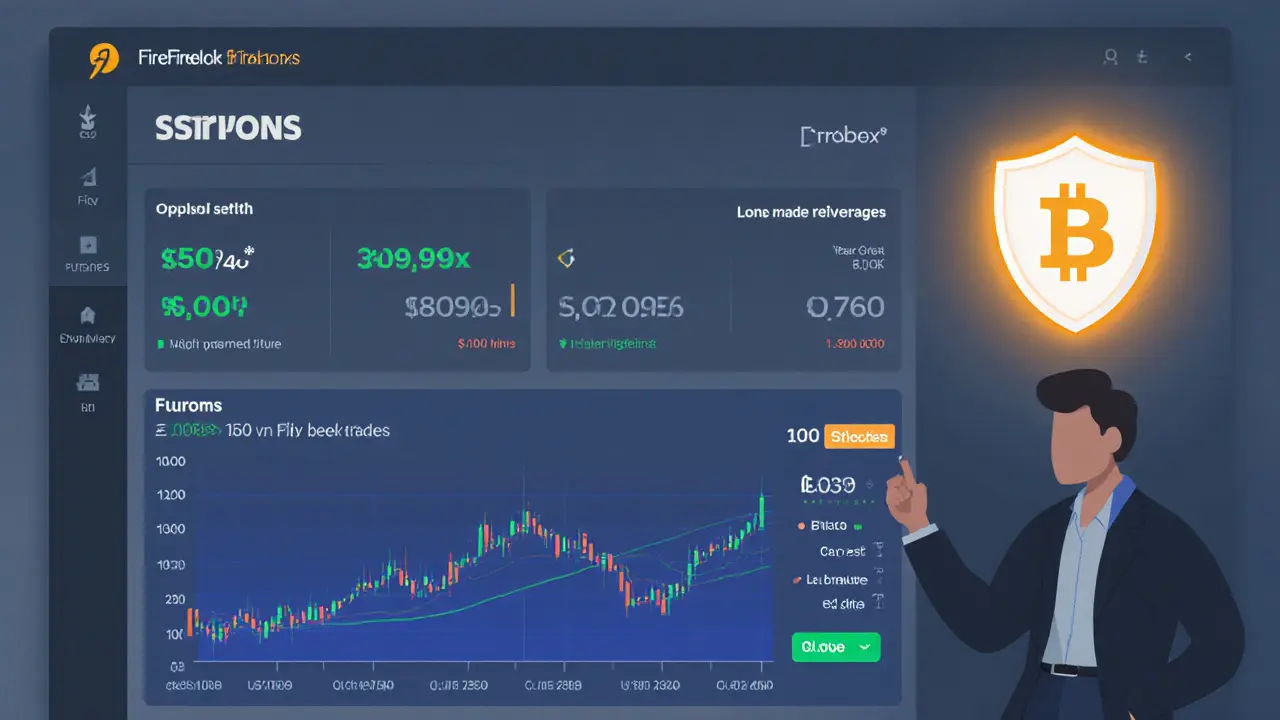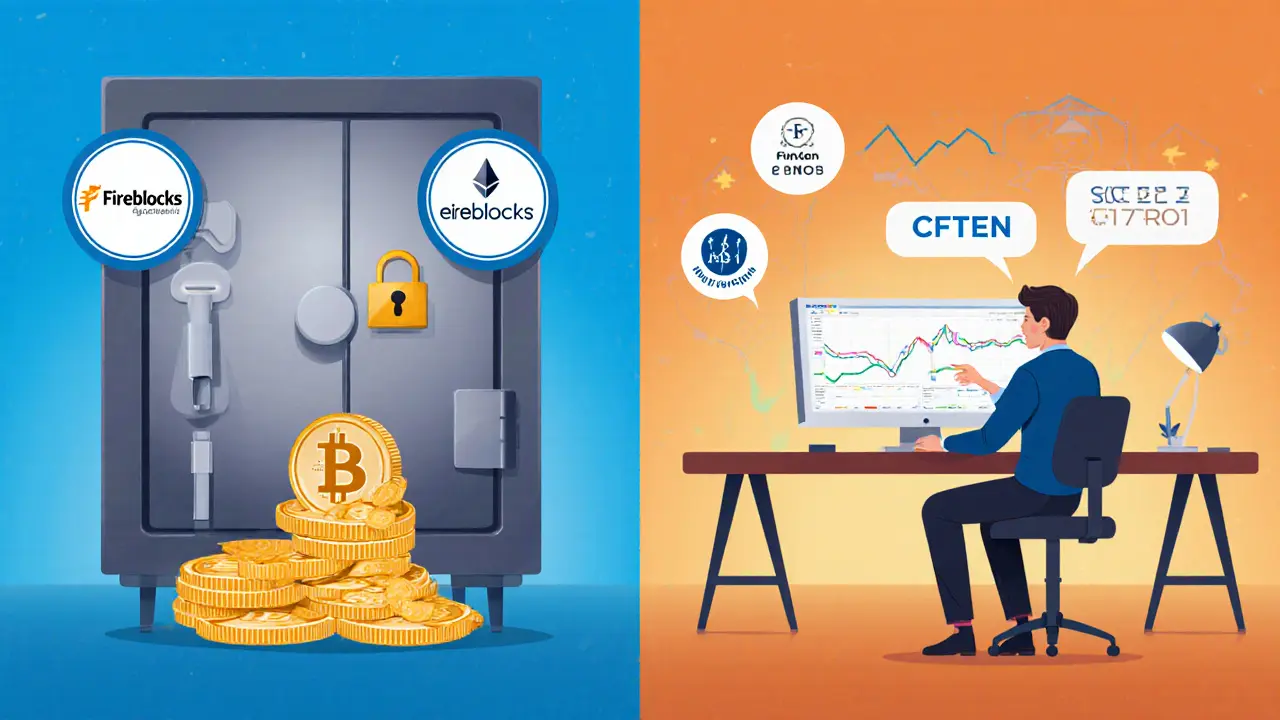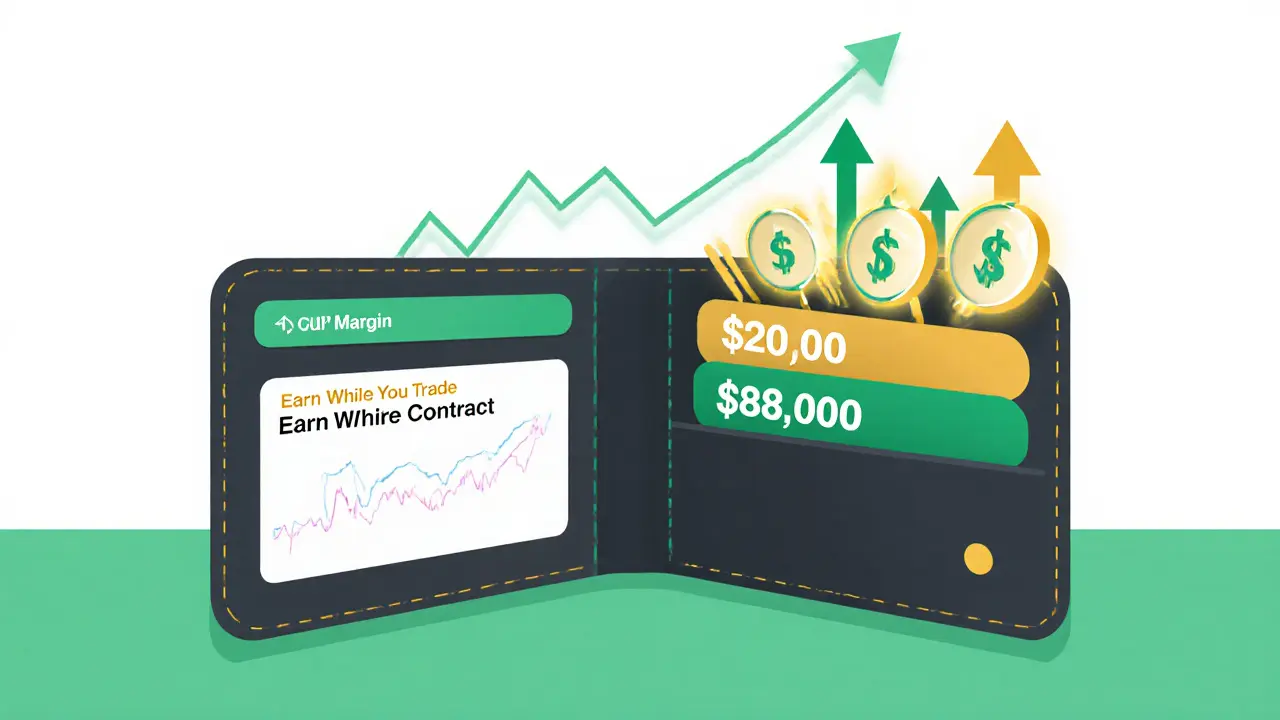Coincall Crypto Exchange Review: Institutional-Grade Derivatives for Retail Traders
 Aug, 27 2025
Aug, 27 2025
Capital Efficiency Calculator
Calculate how much you could earn from your idle capital using Coincall's Earn While You Trade (EWYT) feature. Your unused trading funds earn yield while your positions are active.
Your Estimated Earnings
* Based on 5.5% annual yield, calculated over 30 days
Most crypto exchanges feel like they’re built for speculators - fast charts, loud alerts, and a dashboard that looks like a casino floor. But if you’ve ever tried to hedge your Bitcoin holdings or trade options without getting lost in a maze of confusing terms, you know there’s a gap. That’s where Coincall comes in. It’s not another copycat exchange. It’s a derivatives platform built by ex-Binance, JP Morgan, and Optiver traders who actually made millions trading crypto themselves. And they designed it to solve real problems: security, capital efficiency, and regulatory clarity.
Who Built Coincall - And Why It Matters
Coincall didn’t start as a startup trying to ride the crypto wave. It was founded by Jimmy Zhong and a team that managed a crypto trading desk with over $300 million in assets. Their track record? #1 globally on Binance’s profit and loss leaderboard in both 2020 and 2021. That’s not luck. That’s deep market understanding. This matters because most exchanges hire engineers and marketers. Coincall hired traders who’ve lived through bear markets, flash crashes, and liquidity crunches. They know what institutional clients need - and they built those features into a platform that’s still easy enough for a retail trader to use.What You Can Trade on Coincall
Coincall focuses on two types of derivatives: futures and options. That’s it. No meme coins, no token launches, no confusing new assets. Just Bitcoin and Ethereum - the two coins that move markets.- Bitcoin futures: Trade with up to 100x leverage, long or short, with funding rates that are transparent and predictable.
- Ethereum futures: Same structure, same liquidity, same institutional-grade execution.
- Bitcoin options: Buy calls and puts with fixed expiration dates. No complex strike price grids. Just set your target, pick your date, and go.
- Ethereum options: Same simplicity. Perfect for hedging if you’re holding ETH long-term.
Security: Your Funds Aren’t on the Exchange
This is one of the biggest differentiators. Most exchanges hold your crypto in their own wallets. If they get hacked, you lose everything. Coincall doesn’t do that. All client assets are held by third-party custodians: Fireblocks, Cobo, and Copper. These aren’t random crypto firms. They’re SOC 2 Type 2 certified, meaning they’ve passed rigorous audits on security, availability, and data protection. The exchange itself holds SOC 2 and ISO 27001 certifications - the same standards banks use. Here’s how it works: When you deposit Bitcoin, it goes straight to Fireblocks. Not Coincall’s wallet. Not their cold storage. A separate, audited, insured vault. Even if Coincall’s servers go down, your funds are safe. And you can withdraw anytime - no delays, no excuses.
Regulatory Compliance: Built for the U.S. and EU
If you’re in the U.S., you’ve probably avoided crypto exchanges because they’re either blocked or sketchy. Coincall is different. It’s registered with FinCEN as a Money Services Business (MSB). That means it’s legally allowed to serve U.S. customers under federal law. It also holds a crypto license in Poland, giving it access to the EU market under MiCA regulations. And here’s the kicker: it operates under the CFTC’s Foreign Board of Trade (FBOT) framework. That’s a legal pathway that lets foreign exchanges serve U.S. derivatives traders without breaking rules. Every user must go through KYC. You’ll need your ID, proof of address, and phone verification. No anonymity here. But that’s the point. Institutions won’t touch an exchange that doesn’t follow the rules. And now, so can you.Capital Efficiency: Earn While You Trade
One of the biggest complaints in crypto trading is idle capital. You deposit $10,000 to trade futures, but 80% of it just sits there. Coincall fixes that with its Earn While You Trade (EWYT) feature. Here’s how it works: While your funds are backing open positions, you earn yield on the unused portion. Think of it like a savings account that pays interest while you’re actively trading. You’re not locking up your money. You’re using it smarter. For example: If you open a $5,000 Bitcoin futures position with $1,000 margin, the remaining $4,000 can earn yield. That’s money you’d normally lose to inflation or low-yield wallets. Coincall turns it into passive income.Trading Fees and the VIP Program
Coincall doesn’t publish exact fee schedules publicly, but user reports and industry benchmarks suggest fees are competitive - especially for derivatives. Maker fees (adding liquidity) are often below 0.02%, and taker fees (removing liquidity) are under 0.05%. For high-volume traders, the VIP Program kicks in. It’s not a gimmick. It’s tiered by trading volume and asset balance. Benefits include:- Lower fees (down to 0.01% taker)
- Dedicated account manager
- Priority support with 5-minute response times
- Custom order types and algorithmic trading access

The Early Bird Program: Why Early Adopters Win
Coincall launched with an Early Bird Program to attract serious traders. If you joined before 2024, you got:- Free options contracts (no cost, no risk)
- 50% off trading fees for 12 months
- Priority access to new features like multi-leg strategies and OTC desks
Is Coincall Right for You?
If you’re a retail trader who wants to hedge your Bitcoin without getting ripped off by hidden fees or insecure platforms - Coincall is one of the few options that actually works. It’s not for everyone. If you just want to buy Bitcoin and hold it, use Coinbase or Kraken. If you want to trade Solana memecoins with 1000x leverage, go to a different exchange. But if you’re serious about derivatives - whether you’re hedging a portfolio, trading options for income, or scaling up from retail to institutional-level strategies - Coincall gives you the tools, security, and compliance that most platforms don’t even pretend to offer.Final Thoughts
Coincall isn’t trying to be everything to everyone. It’s trying to be the best place to trade crypto derivatives. And in 2025, that’s exactly what the market needs. The team has the pedigree. The infrastructure is institutional-grade. The compliance is solid. And the features like Earn While You Trade? They’re not just nice-to-haves - they’re game-changers. You don’t need to be a hedge fund to use it. But if you’re tired of exchanges that treat you like a gambling customer, Coincall treats you like a trader.Is Coincall safe to use?
Yes. Coincall doesn’t hold user funds directly. All assets are stored with third-party custodians like Fireblocks and Cobo, which are SOC 2 Type 2 certified. The exchange itself holds SOC 2 and ISO 27001 certifications. Two-factor authentication is mandatory, and identity verification is required for all users.
Can U.S. users trade on Coincall?
Yes. Coincall is registered with FinCEN as a Money Services Business and operates under the CFTC’s Foreign Board of Trade (FBOT) framework, which legally allows foreign exchanges to serve U.S. derivatives traders. U.S. users must complete full KYC verification.
What cryptocurrencies can I trade on Coincall?
Coincall supports derivatives trading on Bitcoin (BTC) and Ethereum (ETH) only. This includes futures and options contracts. No altcoins or spot trading are available.
Does Coincall offer leverage?
Yes. Bitcoin and Ethereum futures offer up to 100x leverage. Options trading does not use leverage - you pay a premium to buy the right to buy or sell at a set price. Leverage is only available on futures contracts.
What is the Earn While You Trade feature?
Earn While You Trade lets you generate yield on the portion of your funds not used as margin for open positions. For example, if you deposit $10,000 and use $2,000 as margin for a futures trade, the remaining $8,000 can earn interest - turning idle capital into passive income.
Is Coincall better than Binance or Bybit?
It depends on what you need. Binance and Bybit offer more coins and spot trading. Coincall focuses solely on derivatives with superior security, regulatory compliance, and capital efficiency tools like Earn While You Trade. If you’re trading BTC and ETH derivatives seriously, Coincall’s institutional-grade infrastructure gives it an edge.
Jennifer Morton-Riggs
November 23, 2025 AT 07:56Okay but like… why does everyone act like derivatives are some holy grail? I’ve been trading crypto since 2017 and most people who use 100x leverage end up crying into their ramen. Coincall might be clean, but if you don’t know how to manage risk, you’re just giving them your money faster.
Also, ‘Earn While You Trade’ sounds like a bank ad. I’ve seen this exact model on Binance Savings - it’s just repackaged yield farming with a fancy name.
Kathy Alexander
November 25, 2025 AT 07:08Let’s be real - this is just Binance Lite with a compliance coat of paint. The team’s track record means nothing if the platform’s user base is still mostly retail idiots who think options are ‘buy low, sell high’ with extra steps.
And don’t get me started on ‘institutional-grade’ - that’s just marketing speak for ‘we hired a lawyer and paid for a SOC 2 audit.’
Soham Kulkarni
November 26, 2025 AT 20:56from india, i tried this platform last month. honestly, the interface is quiet but smooth. no flashy buttons, no popups asking me to buy nft. i traded 0.2 btc futures with 50x, and my margin was kept safe in fireblocks - no issues.
also, the earn while you trade thing? i made $18 in 3 weeks just sitting. not bad for a student. no hype, just work.
Rajesh pattnaik
November 27, 2025 AT 19:05as someone from india who used to trade on okx and binance, i was skeptical. but coincall’s focus on btc and eth only? genius. less noise, more signal.
the compliance part is huge for me - i don’t want my account frozen because some random exchange got flagged. here, i feel like i’m trading with adults. also, the 50% fee discount for early users? that’s real kindness.
Belle Bormann
November 29, 2025 AT 12:14i used coincall for the first time last week and i’m hooked. i’m not a pro but i hedged my eth with a put option and it actually worked. the site was easy, no confusing menus. i messed up the date on my order once but support helped me fix it in 10 min.
the earn thing is cool too - i didn’t even notice my idle cash was making money until i checked my balance.
Jennifer MacLeod
December 1, 2025 AT 02:04finally an exchange that doesn’t feel like a slot machine
no meme coins no fake volume no influencers shilling dogecoin
just btc and eth with real tools
and the fact my money isn’t sitting in some dev’s wallet is a miracle in this space
also the interface is clean like a spreadsheet not a rave
why can’t more platforms be this simple
Linda English
December 1, 2025 AT 12:30I just want to say, as someone who has been burned by exchanges that promised security and then got hacked, the fact that Coincall uses third-party custodians like Fireblocks and Cobo - both SOC 2 Type 2 certified - is not just a feature, it’s a lifeline.
And the Earn While You Trade model? It’s not just about yield - it’s about respecting the user’s capital. Most platforms treat your funds like they’re their own. Coincall treats them like they’re yours. That’s a philosophical shift in the industry.
Also, the regulatory clarity - FinCEN registration, MiCA compliance, CFTC FBOT framework - this isn’t just legal box-ticking; it’s a commitment to long-term sustainability. Retail traders deserve to be taken seriously, not exploited. And honestly? I think this platform might be the first one that actually gets it.
It’s not perfect - no platform is - but it’s the closest thing we’ve seen to a responsible, user-aligned derivatives exchange in years. I’m not just using it; I’m recommending it to my friends who are tired of gambling.
Julissa Patino
December 1, 2025 AT 16:03USA only? lol. you think this is gonna save us from china bots? fake compliance. they got a polish license so they can say theyre legit but theyre still just another offshore casino with a fancy website
100x leverage is a death sentence for 99% of people. and earn while you trade? thats just interest on your margin. nothing special. binance has had that for years
also why no altcoins? because they dont want to be sued by the sec. theyre scared of real markets. this is for scared people who want to feel safe while still gambling